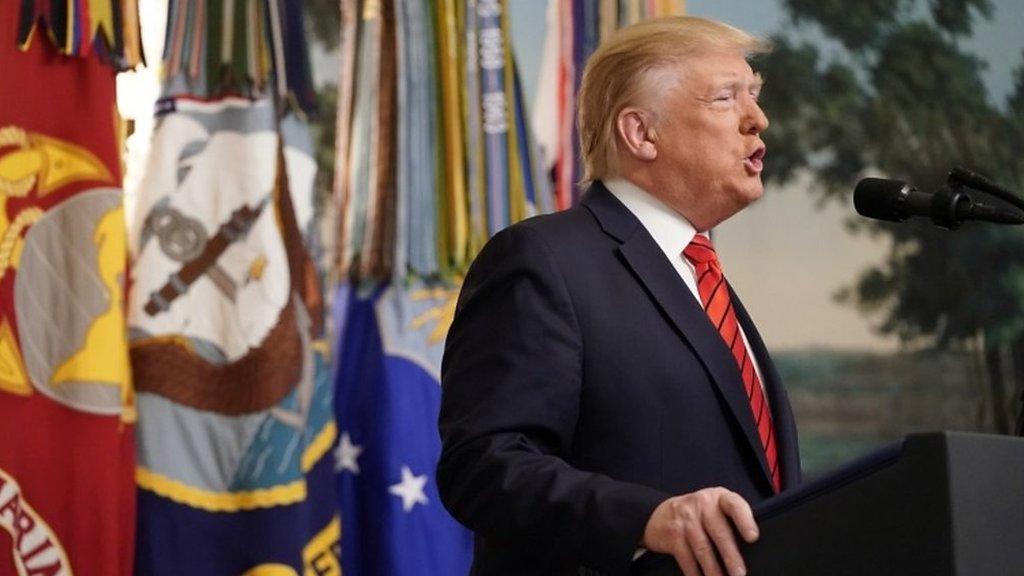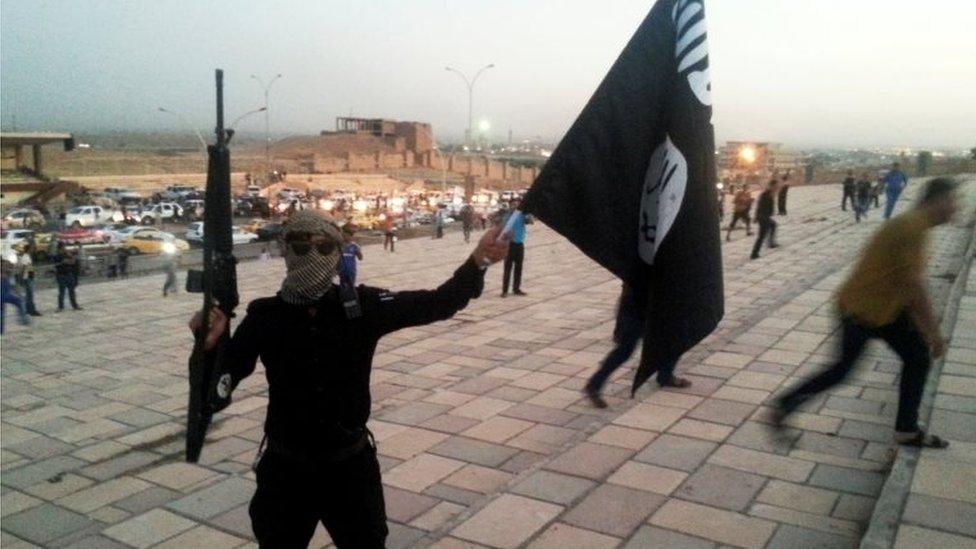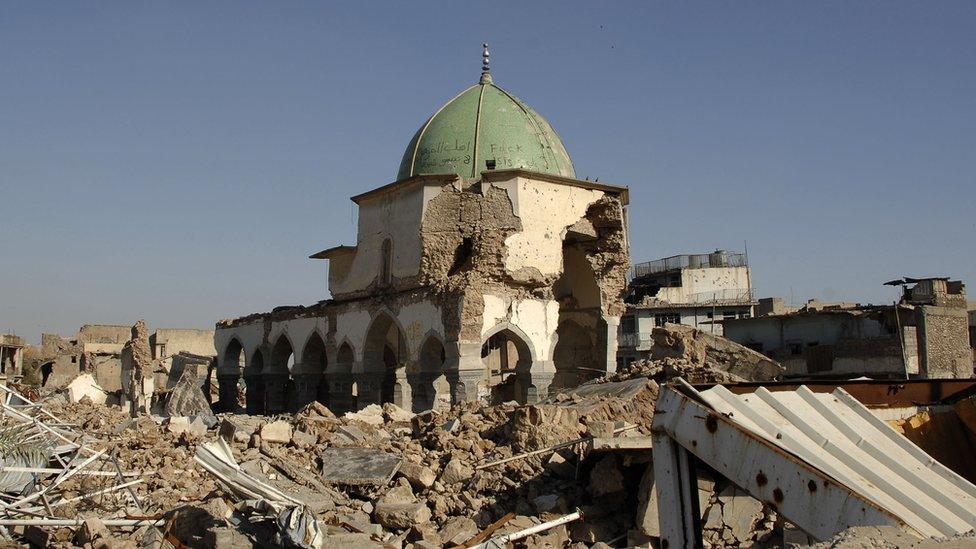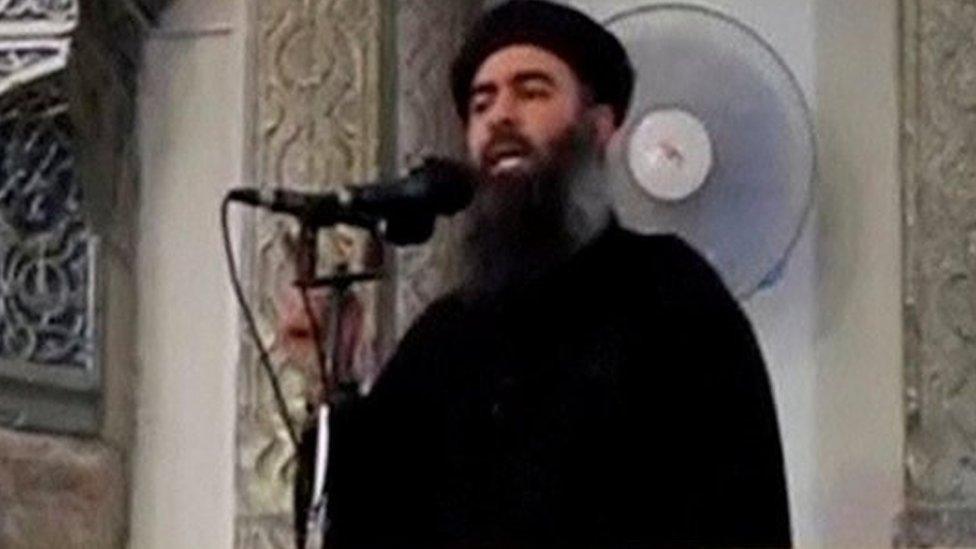Abu Bakr al-Baghdadi death: US military says two men detained
- Published
General David Petraeus on Baghdadi's death
Two men were captured during the US military's raid on Islamic State (IS) leader Abu Bakr al-Baghdadi's hideout in Syria and are in US custody, says the Pentagon.
The Joint Chiefs of Staff chairman said they were now "in a secure facility".
General Mark Milley also announced that Baghdadi's remains had been disposed of and there were currently no plans to share footage of his death.
Baghdadi killed himself during the raid, the US says.
"Baghdadi's remains were transported to a secure facility to confirm his identity with forensic DNA testing, and the disposal of his remains has been done and is complete and was handled appropriately," Gen Milley told reporters.
Gen Milley - the highest ranking member of the US military - said photos and video were going through "a declassification process".
President Donald Trump had earlier suggested that some footage from the raid might be released.
Body language expert analyses Trump's Situation Room photo
There were no further details about the detained men.
Baghdadi died from detonating a suicide vest after fleeing into a tunnel while being chased by US military dogs, President Trump announced on Sunday.
The Pentagon says no US personnel were killed in the raid but one of the dogs pursuing Baghdadi was seriously injured. Gen Milley said the dog's name was classified.
In response to a question about Mr Trump's contention that Baghdadi had whimpered and cried before his death, Gen Milley said he was not aware where the information came from but added: "I assume it was [from] talking directly to unit members."
Gen Milley also said that US troops would continue to protect oilfields from IS militants, though "at the end of the day, we will be sending troops home".
Mr Trump has said the US should be able to take some of the oil, but critics say doing so would violate the Geneva Convention's laws against pillaging natural resources.
Allow X content?
This article contains content provided by X. We ask for your permission before anything is loaded, as they may be using cookies and other technologies. You may want to read X’s cookie policy, external and privacy policy, external before accepting. To view this content choose ‘accept and continue’.

What did Trump say on Monday?
Speaking to reporters before boarding Air Force One, Mr Trump defended his decision to keep the US Congress in the dark about the raid, citing leak concerns.
Mr Trump singled out Adam Schiff, who heads the House of Representatives Intelligence Committee, one of three panels leading an impeachment probe against the president.
"They were talking about why didn't I give the information to Adam Schiff and his committee, and the answer is I think Adam Schiff is the biggest leaker in Washington," he said.
Mr Trump did not provide specific evidence against the Democratic congressman.
Typically, the White House informs select lawmakers about classified intelligence matters. They normally include the House Speaker, minority and majority leaders of both the House and the Senate, as well as the chairs and ranking members of both chambers' intelligence committees.
Mr Trump called Abu Bakr al-Baghdadi a "brutal killer"
When asked whether he would release the footage of the raid - which he has likened to watching a "movie" - the president said: "We may take certain parts of it and release it, yes."
Who was Baghdadi?
The IS leader came to prominence in 2014 when he announced the creation of a "caliphate" in areas of Iraq and Syria.
Although the US declared the "caliphate" defeated earlier this year, IS militants remain active in the region and elsewhere.
Baghdadi's death is being seen as a policy victory for Mr Trump, who continues to face criticism from political rivals and allies for his decision to pull troops out of northern Syria.
Abu Bakr al-Baghdadi killed himself during a raid by US commandos
- Published27 October 2019

- Published27 March 2019

- Published23 March 2019

- Published8 March 2016
